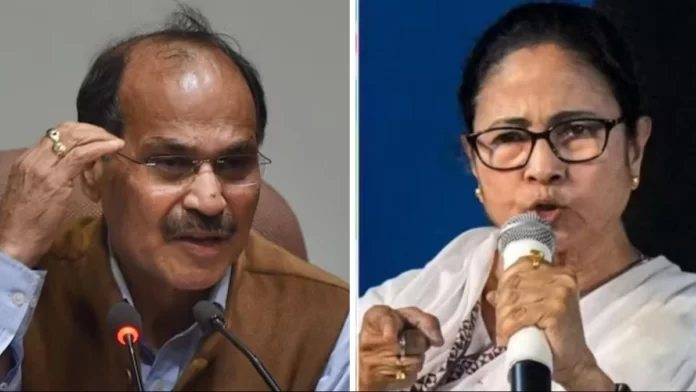In the high-stakes political arena of West Bengal, where every move is scrutinized and every statement dissected, the recent exchange between Mamata Banerjee, the Chief Minister and Trinamool Congress (TMC) chief, and Adhir Ranjan Chowdhury, the Congress leader, has sparked fresh debates and conjectures. Mamata Banerjee’s assertion of securing 40 out of 42 parliamentary seats in West Bengal in the upcoming elections has drawn sharp criticism from Adhir Ranjan Chowdhury, who accuses her of being apprehensive about the Bharatiya Janata Party’s (BJP) growing influence in the state.
Speaking to reporters, Adhir Ranjan Chowdhury minced no words in his assessment of Mamata Banerjee’s statement. He boldly claimed, “Mamata Banerjee is afraid of BJP,” implying that her ambitious target of securing 40 seats is driven more by fear than confidence. This statement from the Congress leader sheds light on the complex political dynamics at play in West Bengal, a state witnessing a significant political churn in recent years.
The BJP’s remarkable rise in West Bengal, once considered a bastion of the Left and then dominated by the TMC, has altered the state’s political landscape. The saffron party’s concerted efforts to expand its footprint in the region, coupled with strategic alliances and aggressive campaigning, have posed a formidable challenge to Mamata Banerjee’s TMC. The BJP’s emergence as the principal opposition in the state has undoubtedly rattled the ruling party and forced it to adopt defensive strategies to safeguard its stronghold.
Mamata Banerjee’s assertion of winning 40 seats reflects not just her confidence but also a sense of urgency to counter the BJP’s ascendancy. The TMC chief, known for her astute political acumen, understands the implications of a resurgent BJP in West Bengal. A significant dent in the TMC’s parliamentary tally would not only dent her image but also embolden the BJP further, potentially paving the way for a more intense political showdown in the state.
Adhir Ranjan Chowdhury’s accusation of fear mongering is rooted in the perception that Mamata Banerjee’s rhetoric is aimed at bolstering morale within her party ranks rather than making a realistic electoral forecast. By setting a high target of 40 seats, Mamata Banerjee seeks to galvanize her cadre and project an image of invincibility, thereby warding off any perception of vulnerability in the face of the BJP’s challenge.
However, the Congress leader’s critique also underscores the vulnerability inherent in Mamata Banerjee’s seemingly bold proclamation. Setting overly ambitious targets carries the risk of creating unrealistic expectations among voters and party supporters. Failure to meet such targets could not only dent the TMC’s credibility but also provide ammunition to its political adversaries, particularly the BJP, to question its competence and leadership.
Moreover, Adhir Ranjan Chowdhury’s remarks shed light on the broader political strategy adopted by opposition parties in West Bengal. While the BJP has aggressively positioned itself as the primary challenger to the TMC’s dominance, other opposition parties, including the Congress, have sought to leverage the emerging political dynamics to carve out their niche. By questioning Mamata Banerjee’s claims and highlighting her vulnerabilities, the Congress aims to position itself as a credible alternative to both the TMC and the BJP, thereby capitalizing on the growing disenchantment among certain sections of the electorate.
As West Bengal gears up for yet another electoral battle, characterized by high stakes and intense competition, the exchange between Mamata Banerjee and Adhir Ranjan Chowdhury offers a glimpse into the underlying political calculus shaping the discourse. While Mamata Banerjee’s assertion of winning 40 seats underscores her determination to thwart the BJP’s challenge, Adhir Ranjan Chowdhury’s critique highlights the inherent anxieties and vulnerabilities within the ruling TMC. As the political drama unfolds in the days to come, it remains to be seen whether Mamata Banerjee’s ambitious target translates into electoral success or serves as a cautionary tale of political hubris in the face of mounting challenges.

